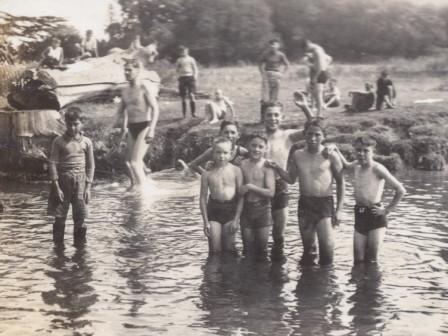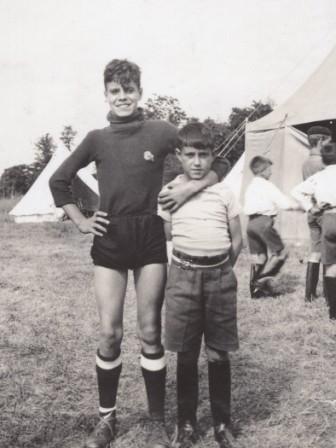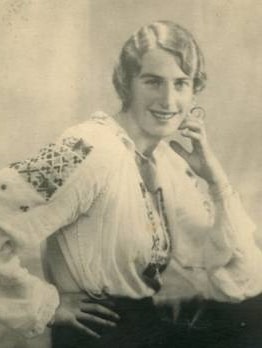
Basque Boys at Oakley Park
Used by kind permission of University of Southampton Special Collections
On 26 April 1937 German and Italian aeroplanes carried out a terror-bombing raid on Guernica, a historic Basque market town. The attack caused international outrage and became one of the most notorious events of the Spanish Civil War. In Britain, humanitarian activists of various political and religious backgrounds called for the evacuation of children from the Basque Country in order to rescue them from further atrocity. Public pressure eventually forced the reluctant British government to admit four thousand young Basques aged between five and fifteen, albeit with no public funds made available for their care. These refugee children landed at Southampton docks on 23 May 1937 and were entirely dependent on the charity and goodwill of groups and individuals across the country.
Poppy Vulliamy, then aged 31, was one of these individuals. She left her home in Ipswich to help with the arrival of the Basques at a vast reception camp at North Stoneham, near Southampton. Poppy had visited Spain and spoke Spanish, which kept her busy in the rather chaotic early days of the camp. Groups of the children were subsequently sent to a number of 'colonies' established by volunteers throughout England, Scotland and Wales. In June, for example, Poppy accompanied a group of one hundred boys and girls to Ipswich, where her older sister Chloe ran a colony at Wherstead Park.
Lurid reports in the right-wing press of bad behaviour at a small minority of the colonies risked turning public opinion against the children during the summer of 1937, especially those who the Daily Mail dubbed the 'Bad Basque Boys'. To help quell the controversy, Poppy Vulliamy took fifty boys from North Stoneham to Oakley Park on the Norfolk-Suffolk border, where Alec Lewis, a local farmer, had loaned her the 'Laundry Land' by the River Dove. This became a campsite with tents borrowed from local Boy Scouts. Unlike most Basque colonies, Oakley Park was funded centrally by the Basque Children's Committee in London: no local organising group was founded in the nearby village of Hoxne.
On the evening of 1 August the boys arrived at Diss railway station: the local newspaper reported that 'great excitement prevailed'. They were met by Poppy Vulliamy, and were conveyed to Oakley Park in private cars. Leah Manning, a former Labour MP and prominent Basque Children's Committee activist, was also with the children at this stage. Besides Poppy Vulliamy as warden, and two of her friends, the camp staff included Mr Stewart, who looked after stores and accounts (and had experience of running hostels for tramps), a sanitation officer, a Spanish teacher, and a medical student. The cook - Señor Gomez - had left his position as chef at the Barcelona restaurant in London to work with the children and was well-liked by them.
Poppy Vulliamy's colony was undoubtedly successful at channelling the boys' energies away from potentially troublesome behaviour, in spite of the primitive conditions and isolation of Oakley Park. The camp provided the children with a routine, and work to do, thereby preventing boredom. The daily schedule included ninety minutes of lessons, a siesta in the afternoon, and ninety minutes of helping with the harvest. The boys could earn chits worth two pence for undertaking extra work: the older boys traded these for mild cigarettes at the camp store, while the younger ones purchased sweets.
As well as keeping the boys well-fed and busy with work, the camp staff allowed them a significant degree of self-government. The Minister of the Navy, for example, was supposed to guard the river and prevent drownings (although the elected candidate could not swim). The Oakley Park democratic experiment was reported in the Whitstable Times as a 'Basque "Republic" in Norfolk' with the journalist speculating that 'if similar schemes had been adopted in all the colonies it may be safely assumed that we should have had no reports of trouble at all.'

Basque Footballers
Used by kind permission of University of Southampton Special Collections
The football pitch provided another opportunity to burn off energy as well as providing a space for social interaction. A series of five matches took place between the Basque boys and the Hoxne 'lads': the young refugees won four of these encounters and drew one, scoring fifteen goals and conceding six. The Hoxne squad included G. Baldwin, J. Banham, R. Baxter, F. Butler and M. Butler, Dennis and Derrick Carter, James Feavearyear, W. Doling, Gerald and Geoff Goddard, C. Knights, R. Lawes, and G. Potter. The Basques also narrowly lost two matches against the older opposition of Diss Tuesday, and beat a Brome and Oakley XI, which contained some Hoxne players.
Some of the residents of Hoxne, especially boys and younger men, developed friendships with the Basque children, including going for walks together and inviting them home for tea. In return, the refugees held an 'at home' event at the camp for local people. However, the Basque boys were not allowed to be left alone with the village girls. Indeed, on the Hoxne Heritage Group's website, an interview with Joan Thornett , a child herself in 1937, reveals that her father forbade her from visiting the campsite. She did not recall why she was banned. Her father possibly had no need to worry: while two Basque boys did get into a fight with each other over a local girl, they ultimately decided she was not worth it when they could both go fishing! On the other hand, Luis Lavilla San Vincente, one of the Basques, later recalled that they had composed and often sang two love songs about the colony at Oakley Park, one containing some quite crude lyrics.
In the middle of August, a downpour flooded the camp, forcing the children to evacuate to St. Edmund's Hall in Hoxne for one night. This served to highlight the temporary nature of the Oakley Park colony, and the impossibility of remaining there beyond the summer months. To secure more permanent accommodation, Poppy Vulliamy wrote to the Bishop of Norwich who allowed her the use of the unoccupied rectory at Rollesby. The children moved there in September, though they found the building in a grim condition. In November the colony relocated again, to Oxfordshire.
Most of Poppy's boys eventually returned to Spain, although some remained in Britain. Those who returned faced mixed fortunes. For example, Alberto Fernandez and Domingo Tomas were repatriated (the former had been on the colony's football team while Domingo was slightly injured in a collision with a car while riding his bike on the Eye Road near the brick kiln). Letters received from the boys after they had returned to Spain revealed that Alberto had found work and was happy, while Domingo was unemployed and poverty-stricken, necessitating the sale of the Meccano given to him in England.
Of the football players, two went on to play professionally. Jose Luis Bilbao, the colony's goalkeeper, became an outfield player for Coventry City and Bordeaux, while Emilio Aldecoa played for Coventry, Athletic Bilbao, Real Valladolid, and FC Barcelona. It is worth mentioning that in the matches against Diss Tuesday, the home goalkeeper was Alec Thurlow, then aged 15, who went on to play for Manchester City between 1946 and 1949. He died of tuberculosis in 1956, in his mid-thirties. It is remarkable to think that, in the summer of 1937, matches on the Rectory Meadow in Diss possibly featured a future Barcelona player against a future Manchester City goalkeeper.

Poppy Vulliamy
Used by kind permission of Daniel Vulliamy.
What of Poppy Vulliamy? In later life she claimed that she became bored when her boys stopped being bad. After her experiences with the Basque children, she returned to Spain to help the Republican effort in the ongoing Civil War, and was evacuated before General Franco's victory in 1939. She also worked at Spanish refugee camps in southern France. In 1940 she married Peter Moller, an artist. The couple made their home at Hoxne and lived on Low Street. Some residents might remember Poppy Moller: she lived in the village for four decades, and was an active member of the Diss Branch of Amnesty International, before spending her last years in a nursing home in Ipswich. She died in the early 1990s.
Poppy's boys never forgot her, nor did she forget them. She was too frail to travel to a reunion in Bilbao in 1985, so they sent a group photograph to 'our unforgettable Poppy'. Hopefully this short outline will help to ensure that her remarkable story, and the stories of those she helped, are not forgotten in the present.